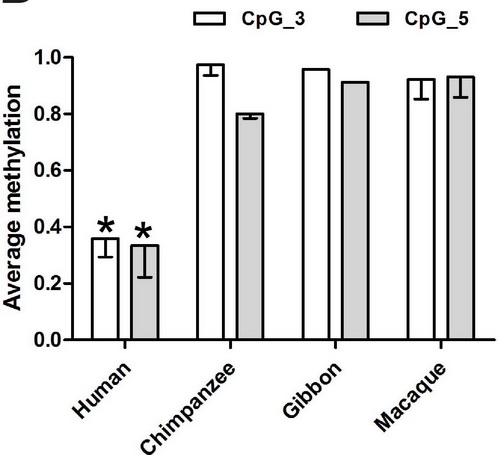Human brain is the most remarkable hallmark that differentiates human from other animal, including non-human primates. Over the centuries, numerous researches have been conducted to try to find out the secrets behind the dramatic increase in brain size and its sophisticated cognitive abilities. But, unfortunately, due to the complexity of brain and the ethical issue, little has been known, especially the molecular mechanisms underlining it at the epigenetic level.
In epigenetics, DNA methylation is a crucial modification of genomic DNA, and has been confirmed to play pivotal roles in gene regulation, synaptic plasticity and memory formation, etc. In a most recent study of Prof. SU Bing’s research team (Kunming Institute of Zoology, CAS), it has been revealed that DNA methylation is also correlated with the size of human brain.
Primary microcephaly is a rare human genetic disorder characterized with a marked reduction in brain size. By genetic screening, seven genes have been implicated to be responsible for this disorder. Among these microcephaly genes, ASPM, CDK5RAP2, CENPJ and MCPH1 have been shown to undergo rapid evolution at the protein sequence level due to Darwinian positive selection during primate evolution and human origin. Accordingly, in Prof. SU’s study, they have used bisulfite sequencing to compare the methylation patterns of these four genes in the prefrontal cortex among humans, chimpanzees, eastern hoolock gibbons and rhesus macaques.
In this research, a significantly lower levels (only approximately one-third of those found among non-human primates) of methylation in the 5’-UTR of CENPJ in human brain has been noticed. Theoretically, low methylation is always accompanied with high level of gene expression. As the expectations, the high expression of CENPJ in the central nervous system of humans has also been detected in this study. Moreover, a large difference in CENPJ expression in the human and nonhuman primate brains of both adult individuals and throughout the major stages of fetal brain development have been founded.
Taken on the whole, by illustrating the effects of DNA methylation of CENPJ on its expression and thereafter the function and development of brain, this study has enriched our understanding of how human-specific epigenetic changes work as the key contributors in the origin of human cognition..
The main findings of this study have been published on Molecular Biology and Evolution (http://mbe.oxfordjournals.org/content/early/2013/11/28/molbev.mst231.abstract?keytype=ref&ijkey=cUj3XzWPKpbMLzw).

Figure1 (B) Average methylation percentages of CpG_3 and CpG_5 in PFC of humans (n=4),chimpanzees (n=2), gibbon (n=1) and macaques (n=3)(Image by SU Bing)





